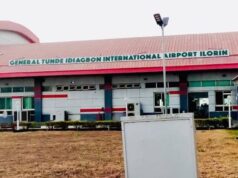
Farmers in Northwest states of Nigeria are already singing different songs as 2021 harvest season begins, with some of them recording bumper harvest, while others are counting losses.
A survey conducted by the News Agency of Nigeria (NAN), covering Kaduna, Kano, Zamfara, Sokoto, Kebbi and Katsina states, showed that rainfall was stable in some areas, and in other areas, it had either ceased earlier than expected or resulted in flooding.
Chairman of All Farmers Association of Nigeria (AFAN) in Kaduna state, Malam Salisu Muhammad, said that most farmers in the state are hopeful of recording good harvest this year.
Muhammad said that crops that promise to yield bumper results are maize, sorghum and beans, whereas rice yield is negatively affected by inadequate rainfall.
Another farmer in Kaduna, Balarabe Aliyu, said that irregular rainfall experienced during the year negatively affected crops.
“Apart from delayed commencement, the rain was irregular, as such the anticipated yield was not realised.”
The Country’s Representative of Feminine Early Warning Systems Network, Isah Mainu said that low rainfall had generally affected yield in some parts of Nigeria during the 2021 wet season.
Mainu said that during a virtual symposium to commemorate the 2021 World Food Day, crops affected are rice, maize, beans, sorghum and cowpea.
He listed some of the states affected to include Katsina, Zamfara, Sokoto, Kano and Jigawa.
Mainu said that conflicts between farmers and herdsmen, as well as the activities of bandits, affected production of crops, and triggered hike in prices of foodstuffs.
Chief Executive Officer of Silvex International, an agribusiness firm in Kano, Alhaji Abubakar Usman-Adam advised farmers to engage in dry season farming, with a view to bridging the food deficit created by low rainfall during the season.
Usman-Adam said that on their part, the company had initiated “Climate-Smart Farm Estates” to bridge the gap in production.
According to him, the estates will be established in collaboration with Jigawa and Nasarawa state governments.
Usman-Adam said thatbfor the project, they intend to engage people from host communities with a view to reducing unemployment.
“They will be trained on the skills, given stipends and at the end of the day, share certain profit with them.
“We want to create a new generation of farmers, because, many believe that farming is not a business venture.
Usman-Adam said that after the training, beneficiaries would go back to their communities and practise what they learnt.
Meanwhile, some farmers interviewed in Kano State said that low level of rainfall affected production of crops.
One of the farmers, Malam Yahuza Alhaji said that most of their crops dried up for lack of enough rainfall, adding that the rain came late, was not regular and did not last long.
A female farmer in Kano, Mrs. Uwani Abdu said that grains that needed much water suffered most, while crops that did not require much water, did fairly well in their area.
“Grains like rice, millet, sorghum and wheat have not actually done well, but maize and groundnut have done well in our farms.
“The main fear is that many farmers have sold their crops to dealers long before harvest, in anticipation of bumper harvest.”
She expressed fear that many farmers might encounter scarcity of food since they had sold out their grains.
Professor Murtala Badamasi of the Centre for Dryland Agriculture, Bayero Univeristy, Kano, expressed the need for farmers to commence irrigation farming to mitigate the effect of the anticipated poor harvest.
Hussaini Abba, a grain seller in Kano, said that a 100 kilogramme bag of local rice is now sold for N39,000, as against its old price of N42,000.
Abba said the same bag for maize costs N19,000, as against previous price of N25,000, while that of millet is sold for N21,000, as against N25,000.
He said that a bag of beans now costs N47,000, as against N48,000 few months ago, while that of sorghum, one of the crops affected by low rainfall, maintains its price of N25,000.
An integrated farmer in Katsina State, Alhaji Abba Muhammad, said that inadequate rainfall recorded this year in the state, had dashed the hope of farmers for a bumper harvest.
Muhammad said that the rainfall did not last long, pointing out that the situation had affected production.
“Here in Katsina, the rain ceased three months ago, and for sure, crops were affected; farmers in Katsina will hardly record bumper harvest this year.”
Also, Chairman of AFAN in Ingawa Local Government Area of the state, Malam Ibrahim Suleiman, said that the rainfall pattern had devastating effects on crops.
“Most of the crops this year did not give us good yield as a result of the inadequate rainfall.”
Alhaji Sahabi Augie, Chairman, Rice Farmers Association of Nigeria (RIFAN) Kebbi State chapter, said that rice farmers in the state recorded good harvest in 2021.
“Many of our famers now smile to different banks, either to lodge or withdraw money, following this year’s bumper harvest.
“We had also experienced some challenges and difficulties at the beginning of the season due to flooding, but we later bounced back.”
A middleman in Birnin Kebbi Central Market, Alhaji Abubakar Sadeek, said prices of food items had gone down in the state due to good harvest in some parts of the country.
Also, in Sokoto State, farmers interviewed said they had recorded good harvests due to stable rainfall.
They said that the abundance of food crops had led to stability in prices, explaining that further price crash is being anticipated as harvesting progres






